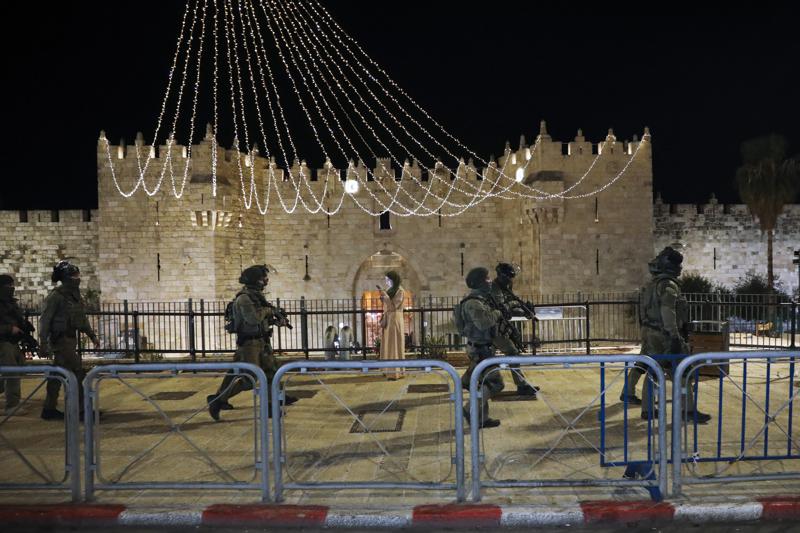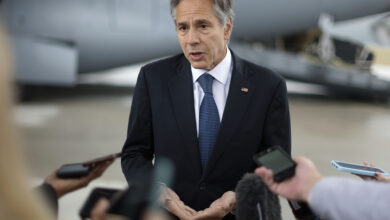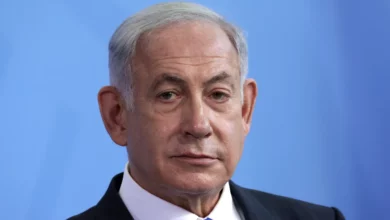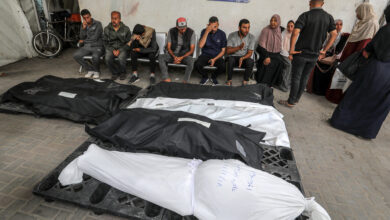
JERUSALEM (AP) — A night of heavy clashes between Palestinians and Israeli police at the Al-Aqsa mosque compound and elsewhere in Jerusalem, where tensions have soared in recent weeks, left more than 200 people wounded, the Palestinian emergency service said early Saturday.
Nightly protests broke out at the start of the holy month of Ramadan over police restrictions at a popular gathering place and have reignited in recent days over threatened eviction of dozens of Palestinians from their homes in east Jerusalem, which is claimed by both sides in the decades-old conflict.
Israelis and Palestinians are bracing for more unrest in the coming days.
The Red Crescent said 88 of the wounded were hospitalized, many with wounds to their eyes and face inflicted by rubber-coated bullets and shrapnel from stun grenades. Israel said at least six police were wounded.
At the beginning of Ramadan in mid-April, Israel blocked off a popular gathering spot where Palestinians traditionally socialize at the end of their daylong fast. The move set off two weeks of clashes before Israel lifted the restrictions.
But in recent days, protests have grown over Israel’s threatened eviction in Sheikh Jarrah in east Jerusalem of dozens of Palestinians embroiled in a long legal battle with Israeli settlers trying to acquire property in the neighborhood.
The United States said it was “deeply concerned” about both the violence and the threatened evictions, and was in contact with leaders on both sides to try and de-escalate tensions.
“It is critical to avoid steps that exacerbate tensions or take us farther away from peace,” the U.S. State Department said in a statement. “This includes evictions in East Jerusalem, settlement activity, home demolitions, and acts of terrorism.”
The Al-Aqsa mosque compound is the third holiest site in Islam. The sprawling hilltop complex is also the holiest site for Jews, who refer to it as the Temple Mount and revere it as the location where the biblical Temples stood. It has long been a flashpoint for Israeli-Palestinian violence and was the epicenter of the 2000 Palestinian intifada, or uprising.
Israeli police deployed in large numbers as Muslim worshippers were holding evening prayers at the site late Friday. It was unclear what sparked the violence, but videos circulating online showed worshippers throwing chairs, shoes and rocks at police, who fired stun grenades and rubber-coated bullets to disperse them. Smaller clashes broke out elsewhere in Jerusalem.
The Israeli police said protesters hurled stones, fireworks and other objects at them, wounding six officers who required medical treatment. “We will respond with a heavy hand to all violent disturbances, riots and attacks on our forces,” it said in a statement.
Some 70,000 worshippers had attended the final midday Friday prayers of Ramadan at Al-Aqsa, the Islamic endowment that oversees the site said. Thousands protested afterwards, waving the green flags of the Islamic militant group Hamas and chanting pro-Hamas slogans.
Earlier on Friday, Israeli troops shot and killed two Palestinians and wounded a third after the men opened fire on a base belonging to Israel’s paramilitary Border Police force in the occupied West Bank, according to police, who said the wounded man was taken to a hospital.
On Thursday, Israeli forces arrested a Palestinian suspected of carrying out a drive-by shooting earlier this week in the West Bank that killed an Israeli and wounded two others. The day before, Israeli troops shot and killed a 16-year-old Palestinian near the West Bank city of Nablus. The military said several Palestinians had thrown firebombs toward soldiers.
Sunday night is “Laylat al-Qadr” or the “Night of Destiny,” the most sacred in the Muslim holy month of Ramadan. Worshippers will gather for intense nighttime prayers at Al-Aqsa.
Sunday night is also the start of Jerusalem Day, a national holiday in which Israel celebrates its annexation of east Jerusalem and religious nationalists hold parades and other celebrations in the city. On Monday, an Israeli court is expected to issue a verdict on the evictions.
Israel captured east Jerusalem, along with the West Bank and Gaza — territories the Palestinians want for their future state — in the 1967 Mideast war. Israel annexed east Jerusalem in a move not recognized internationally and views the entire city as its capital.
The Palestinians view east Jerusalem — which includes major holy sites for Jews, Christians and Muslims — as their capital, and its fate is one of the most sensitive issues in the conflict. In a call to Palestine TV late Friday, President Mahmoud Abbas praised the “courageous stand” of the protesters and said Israel bore full responsibility for the violence.
Israel’s Foreign Ministry had earlier accused the Palestinians of seizing on the threatened evictions, which it described as a “real-estate dispute between private parties,” in order to incite violence.
The Islamic militant group Hamas, which rules the Gaza Strip and opposes Israel’s existence, has egged on the violence, and Palestinian militants in Gaza have fired rockets in support of the protesters.
Earlier this week, the shadowy commander of Hamas’ armed wing, Mohammed Deif, released his first public statement in seven years, in which he warned Israel it would pay a “heavy price” if it evicts Palestinians from their homes.
___
Associated Press writer Fares Akram in Gaza City, Gaza Strip, contributed to this report.
Image: Israeli border police officers deploy during clashes with Palestinian protesters next to Damascus Gate in Jerusalem’s old city, Friday, May 7. 2021. Palestinians protested over Israel’s threatened eviction of dozens of Palestinians in the Sheikh Jarrah neighborhood in east Jerusalem, who have been embroiled in a long legal battle with Israeli settlers trying to acquire property in the neighborhood. (AP Photo/Mahmoud Illean)




